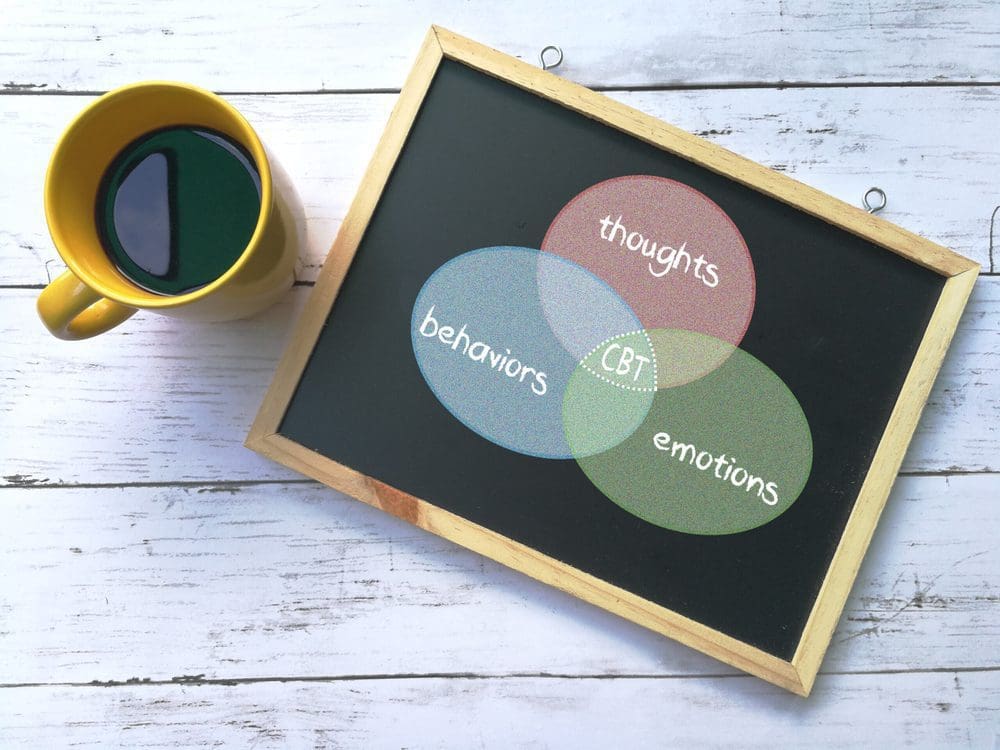
One of the leading treatments in addiction and mental health recovery to develop in the past sixty years is cognitive behavioral therapy (CBT). CBT is used to treat a wide range of symptoms and disorders. But is it right for you? Here’s everything you need to know about CBT and how it factors into addiction and mental health care.
Cognitive behavioral therapy is a series of therapeutic techniques used to treat a wide range of mental health problems, including:
CBT is based on a collection of therapies, and it is often thought of as an extension of the traditional talk therapy. The goal with cognitive behavioral therapy is for participants to practice self-awareness and create a toolbox of gathered skills to use outside of a therapeutic setting.
CBT focuses on the direct relationship between thoughts, behaviors, and emotions. In CBT, patients work to gain an awareness of their thought patterns. They are then able to recognize how negative thinking directly impacts their emotional and behavioral responses to certain situations.
The concept behind CBT shows us that our emotional and behavioral responses are symptoms of our thoughts. When patients unintentionally engage in negative thinking, they are programming their bodies to have a strong, negative reaction to whatever situation in which they find themselves.
Often, CBT tells patients to practice “facing the facts” of a certain situation. By focusing on the facts of an event, patients learn how to control unwanted and harmful emotional or behavioral responses.
For example, a patient who struggles with mental health problems might view failing a test as the ultimate form of failure. This might lead the patient into an anxious spiral (negatively thinking, “now I won’t pass the class or get a good job!”) and cause them to react poorly by dropping their program or lashing out at their teacher.
With CBT techniques, the patient would instead be able to accept the failing grade, challenge their negative thinking (i.e., “I will do better next time!”), and control their emotional/behavioral outburst.
This is how CBT is able to treat a wide range of mental health problems: CBT encourages patients to readdress these harmful patterns and replace old behaviors with healthier techniques.
This means that CBT participants must come face-to-face with challenging situations, reflect on their negative thoughts or emotions, and break the cycle. Their ability to manage high-stress situations related to each individual’s specific problems increases as well.
Cognitive behavioral therapy is typically administered in a specific, limited period of time as a way for patients to quickly and effectively learn the necessary skills. In behavioral health programs, patients practice CBT techniques during their recommended time in treatment.

It’s natural to wonder how CBT would be helpful in cases of addiction and/or mental health problems. Many times, negative thoughts are also automatic thoughts. This means that they are not intentional and are very hard to filter from our minds.
This is especially true in patients who experience mental health struggles and/or substance use disorders, as the thought pattern becomes engrained in their minds. The cognitive and behavioral responses are almost knee-jerk reactions in patients. For this reason, it is important to practice thought awareness through CBT.
While there are many reasons why and how people find themselves in a battle against addiction, one of the most important steps in recovery is recognizing the emotional and situational triggers that lead to using. Addiction often comes from a form of self-medicating, in which people try to numb or escape painful feelings.
However, CBT directs patients to confront these uncomfortable thoughts and feelings. Patients practice tolerance for situations of high stress, and this leads to healthier problem-solving strategies. CBT is proven to assist patients during their recovery. Additionally, CBT skills are preventative and efficient methods to ensuring that a harmful relapse does not occur.
In patients who struggle with substance use disorders, CBT focuses on building learned skills. CBT also directs patients to be goal-oriented. In this way, patients reflect on personal motivators to find the strength needed to practice these new techniques.
As with any CBT practice, this can be done in individual sessions or in group settings. Patients often find it helpful to work on the key elements of these therapies with a group of people who understand the negative thought patterns and the consequences that often come with these.
Sometimes, patients require dual diagnosis treatment for addiction and mental illness. Research shows that CBT can work to address dual diagnosis symptoms. And that’s important, because mental health problems can be a big influence in a patient’s story with addiction. As said before, patients often self-medicate to find relief from physical and emotional distress. Thus, if the root of the problem is addressed with CBT, the patient is then able to move forward in substance use recovery.
Cognitive behavioral therapy approaches will differ depending on each patient’s individual needs. Still, CBT practices often use at least one of the following techniques:
In CBT sessions, patients learn about the techniques specific to their treatment plan. Because Cognitive Behavioral Therapy requires repetition and frequent practice to have the most successful results, patients should expect to receive homework assignments in between sessions.
While these assignments might sound daunting and time-consuming, they are incredibly important in retraining your brain to break automatic thoughts that lead to negative emotional and behavioral responses.
Be sure to speak with your care team to best understand the types of therapy that can work for you. If you struggle with this cycle of negative thoughts, emotions, and behaviors, find a therapist who can introduce you to the benefits of CBT.
Our staff at Baton Rouge Behavioral Hospital offers cognitive behavioral therapy (CBT) in various treatment programs as a way to address concerns of addiction and mental health problems. We believe that healing starts from within.
Please reach out to us today to learn more about our services and your options for recovery. You can contact our admissions specialists at Baton Rouge Behavioral Hospital: (225) 567-8698, or you can reach out via our confidential contact form. Whichever way you need to reach out for help, we will be ready to listen!